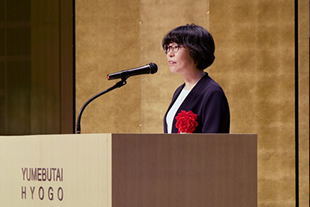 The 24th Asia Pacific Research Prize - Commendation winner: Dr. Yoko Dan
The 24th Asia Pacific Research Prize - Commendation winner: Dr. Yoko Dan
Title of Dissertation: “The Republic of China’s Claims for War Reparations from Japan in the Context of International Relations During and After WWII”

- Dr. Yoko Dan
-
- Career -
Yoko Dan specializes in the history of foreign policy and the history of international relations in East Asia. She graduated from the University of Pennsylvania School of Arts and Sciences, U.S. After working both in Japan and overseas, she completed her studies in the master’s program of the Graduate School of Intercultural Studies, Kobe University in 2014. She also completed her studies at the Department of Modern and Contemporary Chinese History, Faculty of Arts and Humanities, Zhejiang University, China. As a research fellow (DC2) of the Japan Society for the Promotion of Science (JSPS), she conducted her research at the Department of Behavioral and Social Sciences at the University of Maryland, College Park, U.S. as a visiting researcher, funded by the Research Fellowships for Young Scientists program established by the JSPS. In 2022, she completed her studies and earned her Ph.D. in the doctoral program of the Graduate School of Intercultural Studies, Kobe University. She currently conducts research at the University of Tokyo as a research fellow (PD) of JSPS, and teaches as a part-time lecturer at Kobe University and Kobe Gakuin University.
- Summary -
Past studies on the claims of the Republic of China (hereinafter China) for war reparations from Japan have argued that these claims failed as the United States’ punitive reparation policy toward Japan was relaxed and then abandoned due to change in the attitude of the U.S. to its occupation policy, often referred to as "reverse course". However, these studies, which were based on high-level U.S. policy documents, did not elucidate the differences in reparation policies between the U.S. and China and discussion process for war reparations among the Allies. Nor is it clear that these studies examined whether the original U.S. reparation policy toward Japan was punitive in nature. Therefore, the author reverified the issue of China’s claims for war reparations from the perspective of international relations at the time, focusing on the discussion process within the U.S. and Chinese governments and that in the Far Eastern Commission (hereinafter FEC), the Allied Powers highest policy making agency in regard to carrying out the occupation of Japan, which were somewhat ignored by past studies. As a result, the following findings are confirmed:The conventional view is that in the early post-war period, the U.S. government supported the idea of the “development of China as a great power,” and both the U.S. and Chinese governments sought punitive reparations from Japan. However, for the U.S., which played a leading role in the occupation of Japan, reparations were an issue closely related to its own interests in managing the occupation, and it therefore did not want to impose severe reparations on Japan, which could have hindered the management of the occupation from the very start. In addition, when allocating battleships for reparations, the U.S. prioritized dealing with the Soviet Union over China, the country that had suffered the most, due to concerns over the management of the occupation and national security. China, which wanted to claim more reparations from Japan, and the U.S. had conflicting interests regarding the issue of war reparations, and from the outset, China’s claims for reparations did not proceed as it had expected, even before the United States changed its policy. However, within these constraints, the Chinese government actively sought reparations from Japan. As a result, China, which acquired the most significant number of domestic and overseas assets of Japan among the FEC countries, was not considered to have “failed” in obtaining reparations in the international community at the time, and China’s claims for reparations are not seen as thwarted by the change in U.S. policy.
Although it is widely believed that China’s efforts to obtain war reparations from Japan “failed due to a change in U.S. policy,” this theory about the post-war Sino-Japanese reparation issue is likely to have been influenced to a certain extent by Cold War-tinged perspectives and political views of the countries concerned, against the backdrop of the long-standing Cold War and the division of Asian countries.






